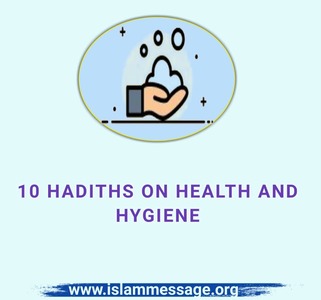
Health, cleanliness and hygiene occupy a great part of Islam’s attention.
While some nations abandoned self-care and cleanliness to attain high spirituality, Islam made it obligatory to clean oneself in preparation for daily prayers.
Caring for one’s hygiene is not only deemed a good habit in Islam but also rendered into rituals that constitute part of the faith itself.
As mentioned above, a Muslim is required to be clean when performing daily Prayers, which includes properly cleansing oneself after using the toilet and practicing ablution.
In some cases, a full body bath is obligatory such as after spouses’ intimacy.
Moreover, the great encouragement for cleaning teeth as shown in the hadiths below reveals to which extent Islam was careful even for the details of personal hygiene.
That is no strange for Islam cares about the wellbeing of the human both in the world and in the hereafter. A healthy strong believer is better in the sight of Allah than a weak one as the former is more qualified to fulfill the objectives of Islam and serve the humanity.
This collection of hadiths presents only some examples of Islam’s stance on health and hygiene:
Cleanliness is part and parcel of faith
1. Abu Malik Al-Ash`ari (may Allah be pleased with him) reported that the Messenger of Allah (peace and blessings be upon him) said: “Purity is half of iman (faith).“
Tooth brushing is highly recommended
2. `A’ishah (may Allah be pleased with her) reported that the Prophet (peace and blessings be upon him) said,
“The miswak (a twig used for tooth brushing) cleanses and purifies the mouth and pleases the Lord.” (An-Nasa’i and Ibn Khuzaimah; authenticated by Al-Albani)
3. Abu Hurairah (May Allah be pleased with him) reported that the Messenger of Allah (peace and blessings be upon him) said,
“Were it not that I might overburden my my followers, I would have commanded them to use the miswak before every prayer.” (Al-Bukhari and Muslim)
Personal hygiene is a human nature
4. Abu Hurairah (may Allah be pleased with him) reported that the Prophet (peace and blessings be upon him) said:
“Five practices are of the fitrah (natural disposition): circumcision, shaving the pubic region, clipping the nails and cutting the moustaches short.” (Al-Bukhari and Muslim)
Rituals on Muslims’ best day
5. Abu Dharr (may Allah be pleased with him) reported that the Prophet (peace and blessings be upon him) said:
“Whoever takes a bath on a Friday and does it well, and purifies himself and does it well, and puts on his best clothes, and puts on whatever Allah decrees for him of the perfume of his family, then comes to the mosque and does not engage in idle talk or separate (pushing between) two people; he will be forgiven for (his sins) between that day and the previous Friday.” (Ibn Majah and authenticated by Al-Albani)
Keep environment clean
60+ Branches of Faith: How to Prioritize
6. Mu`adh (may Allah be pleased with him) reported that the Prophet warned,
“Beware of the three acts that cause you to be cursed: relieving yourselves in shaded places (that people utilize), in a walkway or in a watering place.” (Ranked sound, hasan, by Al-Albani)
7. Abu Dharr Al-Ghafari (may Allah be pleased with him) reported that the Prophet (peace and blessings be upon him) said,
“Removing harmful things from the road is an act of charity (sadaqah).” (Authenticated by Al-Albani)
Using medicine is encouraged
8. Usamah ibn Sharik (may Allah be pleased with him) narrated:
I came to the Prophet (peace and blessings be upon him) and his Companions were sitting as (quiet as) if they had birds on their heads. I saluted and sat down.
The desert Arabs then came from here and there. They asked: Messenger of Allah, should we make use of medical treatment?
He replied: “Make use of medical treatment, for Allah has not made a disease without appointing a remedy for it, with the exception of one disease, namely old age.” (Abu Dawud and authenticated by Al-Albani)
Be strong and healthy
9. Abu Hurairah (May Allah be pleased with him) narrated that the Messenger of Allah (peace and blessings be upon him) said,
“A strong believer is better and dearer to Allah than a weak one, and both are good.
Keenly pursue what benefits you, seek help only from Allah, and do not give up.
If something befalls you, do not say, ‘If only I had done otherwise.’
Rather say, ‘Allah so determined and did as He willed,’ for ‘if only’ opens the door to Satan’s work.” (Al-Bukhari)
Overeating is not healthy
10. Al-Miqdam (may Allah be pleased with him) narrated that the Prophet (peace and blessings be upon him) said:
“No man fills a container worse than his stomach.
A few morsels that keep his back upright are sufficient for him. If he has to, then he should keep one-third for food, one-third for drink and one-third for his breathing” (Imam Ahmad and At-Tirmidhi and authenticated by Al-Albani)
Prophetic Medicine: Every Illness Has Cure
I once asked an Austrian friend of mine who had just qualified as a doctor where he went when he was sick.
The surprising answer was that he and most of his colleagues went to a homeopath. He reminded me of our family G. P. who didn’t believe in medicines. I was told ‘just take your son home and make sure he eats well’.
My friend’s preferring a homeopath to one of his fellow professionals, was as I later found out, a rejection of what he had learned during his many years of study. He felt that he had been taught a set of beliefs, which, in his words, ‘did more harm than good’.
He believed that he had been trained to ‘manage symptoms using chemicals’ and that his profession had nothing to do with looking for cures or curing people. Also, he told me that he felt dirty when he had finished his shift and that he wasn’t being ‘true to himself’.
My friend may be an exception and is probably frowned upon and dismissed as a crank by other doctors, but, his views raise many interesting issues relevant to professionals and non-professionals alike.
There is an increasing interest in alternative approaches to health. The rise in health shops and alternative clinics shows that the world of commerce is cashing in on this fact.
Most bookshops stock books on acupuncture, homeopathy and other forms of Eastern medicines. However, the West’s search for an alternative has overlooked the medicine of the Muslim world, sometimes referred to as al-Tibb al-Nabawi, the medicine of the Prophet or Islamic medicine.
Illness
The word illness, marad, is used in the Qur’an in two different ways. ‘It is no fault in the blind nor in one born lame, nor in one afflicted with illness (marad)’ (Surat An-Nur 24.61).
This example and the verses like it give special licenses to one who is sick. These licenses include delaying the compulsory fast and not having to fight during wartime.
Verses such as ‘and any of you who is ill or has an ailment in his scalp should in compensation either fast or feed the poor’ (Surat Al-Baqara 2.196) which refer to the sick pilgrim not having to shave or cut his or her hair, led Muslim scholars to attempt to find a legal definition of the word marad, illness.
The jurists set out the basis for practical diagnosis. They identified the means by which one could judge illness which included irregularities in the blood, urine, stool, and semen; imbalance in patterns of sleep, eating and drinking and the appearance of wind, sneezing and vomit.
Illness was defined as being ‘out of balance’. This encompassed both physical and mental states. The mental or emotional state is the second usage of the word marad in the Qur’an. ‘In their hearts is a disease (marad)’ (Surat Al-Baqara 2.15).
The heart (qalb), here, refers to ‘the seat of the emotions’, Physically, one is considered to have an illness if one is ‘out of balance’. Likewise, one is emotionally sick if one is out of the natural and pure state that we were created in.
Doctors are needed for some of these emotional and physical illnesses; for others they aren’t. Tiredness is a symptom of being ‘out of balance’ which can be rectified simply by sleeping.
Islam sees the ultimate curer of these states to be the One who created them. He sent doctors to His creation such as Jesus who cured the leper as well as those suffering from pride and inflated egos.
The last of these great doctors was Muhammad, upon him be peace, who, through his advice and practice, set out principles for curing both types of illness.
State of Balance
Common to many systems of alternative medicines is the concept of ‘balance/imbalance’. One’s natural healthy state is a balance between the four qualities of dryness/wetness and hot/cold. The reason a person may have left this state can be either ‘material’ or ‘consequential’.
Material sickness is where a substance has entered the body and has caused its balance to shift in one of several directions. Once the substance is gone the body will return to its natural mizaj, the model of balance.
A ‘consequential’ illness is where the effect of a substance in the body remains after it has left the body. The body is left with an excess of heat/cold or dryness/moisture.
Prophetic medicines perceive illness as being caused by either this state of imbalance or damage to an organ or to the natural weakening caused by old age.
The doctor’s first job is to discover the cause of illness, consider its cause, think what might encourage it to return it to its correct state act upon that and then depend on the Creator.
Al-Tibb Al-Nabawi
The name al-Tibb al-Nabawi literally means prophetic medicine. In fact, it’s based upon the sayings of Prophet Muhammad (PBUH). However, it encompasses much more than the relatively small number of prophetic sayings.
It incorporated Greek and Indian philosophy and practice wherever they were found to be in accordance with the general principles of Islam.
The sayings of the Prophet (Peace and blessings upon him) set down general guidelines and principles which later led to the great discoveries and observations of the likes of Ibn Sina and other Muslim thinkers. This series of articles will be an introduction to some of these principles.
Preparation of Medicines
Most medicines in al-Tibb al-Nabawi are based on the dietary advice of the Messenger, upon him be peace. A simple illness requires simple medicine.
The cure for imbalance leaning towards heat would be something cold. In fact, the classic example is the fever. The Prophet said, “Fever is from the hell, put it out with water.” (Bukhari and Muslim)
A complex illness e.g. one leaning to hot-dry would require a complex mixture, in our example a cold-dry cure.
Every Illness Has Cure
The Prophet (PBUH) said “For every illness there is a cure. If the cure matches the illness, improvement will take place by the permission of God.” (related by Jabir in the book of Sahih Muslim) and “God didn’t send down an illness except that He sent down a cure.” (Bukhari).
The above sayings establish their important principles. Firstly, they encourage the administration of medicines. In fact, there is agreement among the majority of Muslim scholars that it’s a must.
Secondly, they imply that, if administering medicine is a compulsion, then searching for a cure must also be a compulsion. Finally, they emphasize the dependence on God.
In this modern age of ours, we tend to depend on the medicines and not on the True Curer. It is interesting to look at how few remember God in illness until they realize their illness is terminal and that there is no hope for a cure.
My own experience is that it is extremely upsetting and often devastating for both patient and doctor when the limitations of modern medicine dawn on them.
Spiritual & Physical Cures
Muhammad, upon him be peace, described specific cures which included the likes of honey for the chest and liver. He also described procedures and principles, e.g. ‘emptying the stomach and putting out the fever with water’.
In addition, he prescribed prayers and supplications for things like headaches and general sickness. You can find these in hadith books, traditions, as well as in the various books of prayers of the Prophet.’
Diet is Key to Good Health
Himya meaning both precaution and diet. Himya, with both of these meanings is the central pillar of Islamic medicine.
The principle is in the Qur’an which permits using sand in place of water in ablution and washing, if the latter is detrimental to health. There was an occasion when the Prophet came with his cousin, Ali, to the house of Um al Mandari bint Qays al Ansari.
They began to eat when Prophet Muhammad (PBUH) stopped and said to Ali ‘you are recovering.’ He took some barley and chard and gave it to him saying ‘this is better for you (related by Ibn Majah)’ The incident is an explanation of the principle of himya in its fullest sense.
Harith, described as the doctor of the Arabs, said ‘himya is the source of every cure, the stomach is the home of every illness.’ The Messenger said: ‘The stomach is the well of the body and the veins drink from it. If it is healthy, the veins pass on good health, if it is sick the veins pass on poison’.
You can use dietary precaution himya, in three stages: 1. As a cure. 2. To keep the body healthy. 3. To aid recovery. Based on the model of Ibn al Qayyim, hakims and traditional doctors have developed a sophisticated system of dietary medicine.
General Behavior & Basic Hygiene
The Messenger came to perfect behavior. He taught not only us what foods we should eat hut how they should be prepared. Things like covering food, washing hands before eating and boiling food thoroughly when cooking were all stressed by the Prophet.
In fact, the same is true of the etiquette of eating. The Messenger taught us to sit in such a manner that food would fill our stomach only to a third of its capacity.
The Messenger, upon him he peace, mentioned over seventy specific foods which he considered healthy. Modern science has confirmed that he was right. Among the foods mentioned were honey, dates, vinegar, fish, and ginger.
References:
1- Al Bukhari (1980) Jami al Sahih. 2. Al Hakim (1965) Majmu’ Zawaid. 3. Ibn Al Qayyim (1987) Al Tibb al Nabawi al Taiba. 4. Muslim (1965) Jami al Sahih.




